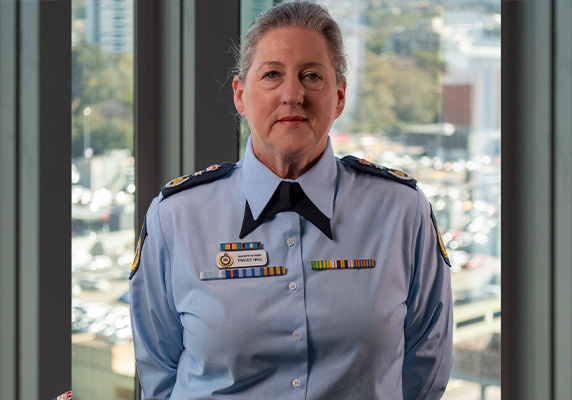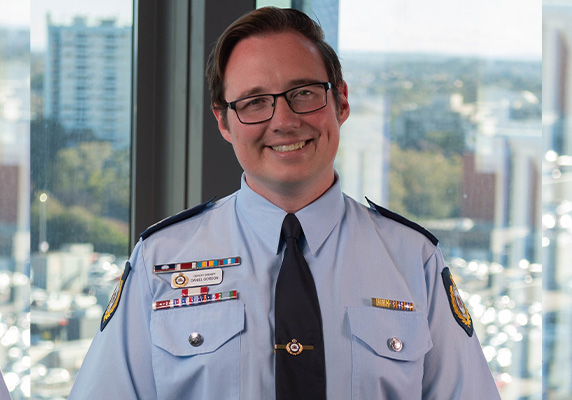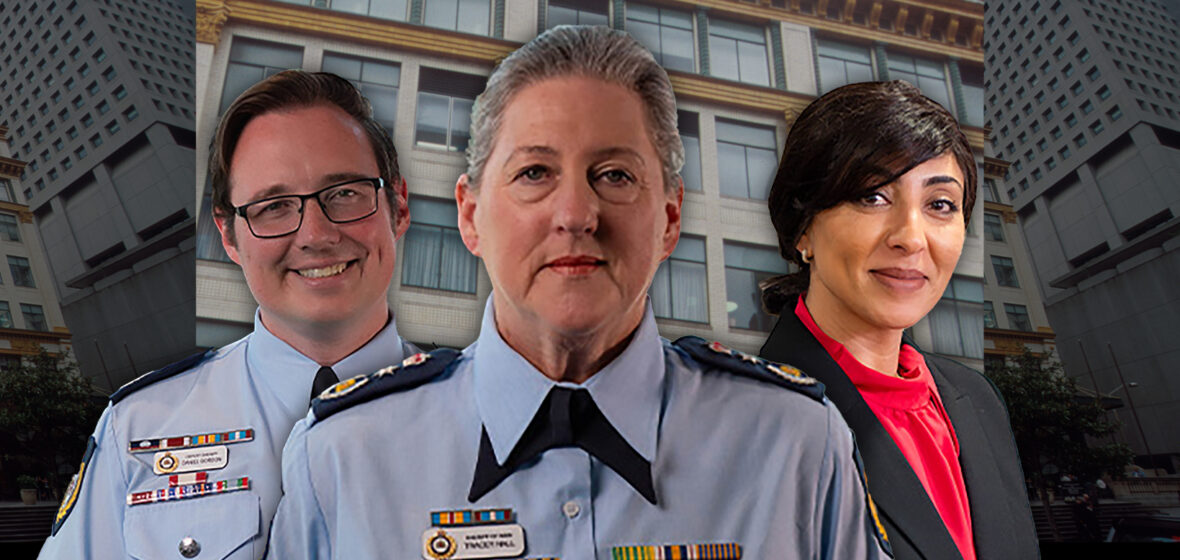Inside the Office of the Sheriff of NSW: the people who hold the lead positions today, and the sometimes surprising history of the role of Sheriff
A wooden lottery barrel and a tray of numbered balls sit redundant near the reception desk outside the Office of the Sheriff of NSW, Tracey Hall. “We’ve moved on a little bit,” says Deputy Sheriff and Jury Manager Jacqueline Hanna, “but this was our random-number-selection system.”
Hall looks doubtful. “It could probably do with a dust,” she says. “But anyway …”
Around the reception walls is a gallery of Hall’s forebears, often craggy-looking characters wearing mutton-chop sideburns and handlebar moustaches.
Who was the first woman Sheriff? “You’re looking at her,” says Hall.

Although Nerida Johnston acted in the position between 1997 and 1998, Hall is the first permanent female appointee. She has been in office since 2012 and, as far as she is aware, she is also the first Sheriff of NSW to have been both a police officer and a lawyer.
A sticky end
Things did not always go well for Hall’s predecessors.
“Quite a few had a sticky end,” she says. “In the old days, they didn’t use to pay them – they used to take a percentage of the money they collected, as the incentive to do their job.”
Predictably, this incentivised them in other directions too.
On the wall of Hall’s personal office is a cutlass framed behind glass. It was a gift, she says, but the office has a history with lethal instruments.
“The original role of the Sheriff involved carrying out executions on behalf of orders made by the court,” says Hall.
Not actual executions? “Yes,” says Hall, “actual executions were carried out personally by the Sheriffs.”
But she doesn’t get to do that? “Unfortunately not,” she says, smiling. “Sometimes I have a real desire to break that glass …”
“The original role of the Sheriff involved carrying out executions on behalf of orders made by the court.”
The role of the Sheriff’s Office is to protect the justice system and ensure everyone who comes to court can safely access their rights. The Sheriff and her four deputies are responsible for court security, fines enforcement and jury management, and the Sheriff employs 400 Sheriff’s officers, court officers and clerical staff at 58 offices throughout the state.
A lawyer, police officer – and Sheriff
The current Sheriff grew up in Sydney. Her father was a police officer, her mother a dressmaker. She joined the NSW Police in 1981 after taking a TAFE course in management, excelled in her studies at the Police Academy and says she was immediately offered a position with Police Prosecutors – but opted instead for general-duties police work, then went into the squads in the city.
In 1987, she started studying law through the Legal Profession Admission Board, while raising a baby and working full-time. And she finally accepted a Police Prosecutors post, as the hours were easier for a parent.
She passed her law degree in 1995, then left the police to work for a suburban law firm in Marrickville, where she did everything from probate to criminal matters.
“I found it a little bit difficult to try and defend people for matters,” she says, “when I’d spent a number of years putting them away. I had philosophical issues that I had to get over, and I wasn’t doing a really good job of getting over that because I just wasn’t comfortable about getting clients off on legal technicalities. It didn’t sit well.”
She moved into a position as an advocate at the Victims Compensation Tribunal, then worked in Victims Services, and then became Assistant Director, Court Services, where she was advised to apply for the Sheriff’s role by the then Deputy Secretary, Courts & Tribunal Service at the Department of Justice, Michael Talbot.
“He thought that my background would be the perfect fit for the role …” says Hall. She smiles “… and he probably was right.”
Not always a nice place
Sheriff’s Officers attend about 170 locations in NSW, and Hall says there is an incident of some kind more or less every day. Most of the larger courts operate airport-style perimeter security systems staffed by Sheriff’s Officers. “Daily, they confiscate knives and prohibited items,” says Hall. “Last week, a female tried to smuggle in a .22. She had it somehow secreted on her person and thought she might get through – but she didn’t. What she was going to do with it, I have no idea, but the police were called and she was arrested.”
Other incidents are more innocent.
“People bring different things for different reasons,” says Hall. “Somebody was going to play hockey, so they had the hockey stick and all their gear, and we said, ‘Well, you don’t really need the hockey stick in court’.”
Every sworn Sheriff’s Officer has to go through a 10-week intensive program at the Sheriff and Justice Academy at Parramatta, where they learn about the 60 or so Acts under with they operate and go through tactical-engagement training. “A lot of our training focuses on de-escalation and communication skills,” says Hall. “Whether they’re here as a victim, an offender or a support person, everybody in courthouses has got heightened anxiety. And sometimes, if you’ve got a lot of people in one place, that sort of anxiety boils over.
“It’s not always a nice place to come,” she concedes, “because you might not be leaving.”
‘[Court] is not always a nice place to come, because you might not be leaving.’
Occasionally, a prisoner attempts to escape. When prisoner Ali Chahine was denied bail at the Downing Centre in 2015, he overcame two Corrective Services officers, jumped out of the dock, ran from the courtroom and dashed out through a fire exit and into the street. “Right outside the fire exit is a bus stop,” says Hall. “He jumped on the bus and the bus left and went down to Central railway station.”
Sheriff’s Officers flagged down a passing car and went off to search for Chahine, but he was not recaptured until police tracked him down to a unit in Alexandria a few days later.
Outside the courtrooms, Sheriff’s Officers – who wear body armour and are equipped with handcuffs, an expandable baton and oleoresin capsicum spray – are also called to potentially dangerous jobs.
“We go to places when people are at their most vulnerable,” says Hall. “Our officers sometimes drive four hours into the country to tell somebody, ‘We’re evicting you from your premises.’ They can be volatile situations. Many people in country areas have firearms.
“People do get anxious and can sometimes react badly. Only a week and a half ago, two of my officers went to an industrial premises in Preston. They were serving a document, and the guy just lost it, came out with a hammer and started attacking one of my officers. He got smashed in the head with a hammer and put his hand up to protect himself – and he got his hand smashed as well.
“[The property owner] then got into a very big forklift and chased them; one of them was in a car, and he came in from the side and tried to flip the car with the forklift!”
Deputy Sheriff and Director of Operational Capability and Performance Daniel Gordon says the Sheriff’s Office plans to roll out a pilot program of body-worn video cameras in the next six months.

As research shows, “there’s a change in people’s behaviour when they know that their behaviour is being recorded”, says Gordon. “Where someone might be likely to threaten violence or intimidation, when they know that there’s that little device there recording them, there’s an introduced sense of increased accountability for their own actions.”
Gilgandra-born Gordon, who came to the Sheriff’s Office from the Rural Fire Service, acknowledges that most of the Sheriff’s “customers” are “involuntary”, but says, “One of our biggest client groups is the legal profession. We’re looking at investing significantly in the improvement of our civil-enforcement capability: we want to get to a stage where the legal profession and legal practitioners see the writ-of-levy-of-property process [an order for the Sheriff to seize and sell property] as a very effective tool for recovering monies owed to creditors. So we’re rolling out mobile field EFTPOS machines to all Sheriff’s Officers.”
Later this year the office will have a full online payment portal, too.
However, lawyers are most likely to meet Sheriff’s Officers in the courts, where Hanna’s responsibilities as Deputy Sheriff and Jury Manager include the oversight of trial juries. The Sheriff’s Office summons up to 750,000 jurors each year, and on average, the courts run 800–900 jury trials annually. In 2022, the district courts managed to get through about 740 cases, even though there were still some pandemic measures and restrictions in place.

While some citizens have sought to be excused from jury service because of COVID-related concerns, others offer more colourful reasons why they should stay at home.
“I’ve had a couple around pets,” says Hanna. “I’m very much an animal lover, so a part of me does understand, but the legislation doesn’t allow for not leaving your pet because they have separation anxiety.”
Desperate to serve
“Some people wear T-shirts with slogans on them that are … rather inappropriate,” says Hall. “All in an attempt not to get selected.” For example? “‘Lock ’em up’!” says Hanna. “Those shirts are renowned.”
Surely not.
“I’ve seen it,” says Hanna. “I’ve seen people turn up in stubbies and thongs, dressed for a day at the beach rather than a day in court.”
“Well, I think a lot of them actually come here on their way to the beach,” says Hall, “just to turn up and get excused so they can go to the beach.”
Other members of the public are absolutely desperate to serve.
Sometimes the Sheriff’s Office has to gather a large number of potential jurors for processing, and ask them to return at a later date.
Hanna remembers: “This one woman cornered me, literally, and said, ‘I’m coming back next week. I’ve watched all the crime shows on Netflix and Your Honor on Stan. I know all the language. I need to be picked.’ So I explained the [electronic] random selection process to her, and she said, ‘I’ll see you Monday.’ She came back on Monday: ‘I’m here! Am I going to get picked?’ I explained the random selection process. She didn’t get picked, but she came back, and she said, ‘How long will it be until I come back? I’ve watched all the shows!’”
Many jurors find their role fulfilling. “A few of my court officers within the Jury Services team actually became interested in the role after serving as jurors,” says Hanna.
Where’s the horse?
Egypt-born Hanna worked in Victims Services before she joined the Sheriff’s Office three years ago.
“I took up the role at the height of COVID,” she says. “There was a short period when there were no juries – there was this mania, and everybody was running out buying toilet paper – but I’m proud of what we were able to achieve by keeping jury trials going throughout the pandemic.”
The Sheriff’s Office was forced to consider new ways of running jury trials, “taking into consideration the social distancing that went from two square metres to four square metres”, says Hanna. “It was a process of reassessing every single courtroom and jury room that we had across the whole state, looking at how we could run it.”
In courtrooms, she explains, “We had to seat every juror one or two seats apart [on each side, and above and below] so we expanded the jury box and spread the jurors out to either sit in front of jury boxes or to the side of jury boxes, and also in the public-gallery area where normally members of the public would sit.
“My team weren’t able to work remotely,” says Hanna. “They came here every day. They were key to making sure we continued to keep the criminal-justice system running.”
One hundred and twenty Sheriff’s Officers worked with the Rural Fire Service during the bushfire emergency of 2019, facilitating logistics and communications and helping to deliver food. Immediately afterwards, they were called on to help NSW Police with hotel quarantine and community compliance.
Sheriff’s Officers were out in the community across the state, throughout the pandemic. And yet, many people who have no contact with the justice system are not even aware that they exist.
“I always get, ‘I didn’t know we had Sheriffs in Australia’,” says Gordon, “or ‘Where do you keep your horse?’”




